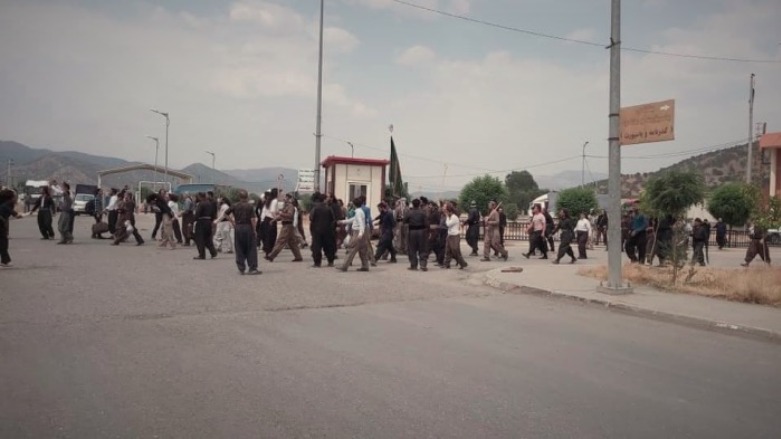Sufi crowds force through Iranian border into Kurdistan Region to attend leader’s funeral

ERBIL (Kurdistan 24) – As many as 2,500 followers of a Sufi Muslim order on Thursday forced their way into the Kurdistan Region through the Bashmakh border crossing from Iran to attend a funeral ceremony for the group’s leader.
Sheikh Muhamad al-Kasnazan, head of the sect known as Tariqa al-Aliyya al-Qadiriyya al-Kasnazaniyya and considered a descendant of the Islamic Prophet Mohammed, passed away on Saturday in the United States where he was receiving medical treatment, according to an obituary on Kasnazan Way, a website associated with the group.
Kasnazan’s remains are expected to be repatriated to the eastern Kurdistan Region city of Sulaimani in the coming days. The Sufi order, also referred to as Kasnazani for short, called on adherents of the faith “to join, where possible, in the reception of the blessed body and the funeral.”
Kasnazani followers, some of whom are called dervishes, who are residents of the western Kurdish regions of Iran sought to take part in the upcoming ceremonies in neighboring Sulaimani, despite current border regulations that prevent civilians from using the Bashmakh international border crossing due to the coronavirus outbreak.
سەدان دەروێش بەناوی بەشداریکردن لە پرسەی شێخ محەمەد کەسنەزانی، لە دەروازەی باشماخەوە هاتنە نێو هەرێمی کوردستان و لە ئەنجامی تەقەی هێزە ئەمنییەکانی ئێرانیش چواریان کوژران. pic.twitter.com/A8RlmCiIvO
— Kurdistan24 Kurdish (@kurdistan24tv) July 9, 2020
“The dervishes wanted to enter Kurdistan Region soil, but Iranian security forces blocked them,” commander Mariwan Sheikh Kamal, the head of Bashmakh border control, told Kurdistan 24. Kamal noted that tensions rose when the crowds of Kasnazani followers insisted on crossing anyway.
As Iranian forces opened fire to disperse the crowd, “four dervishes were killed,” he claimed.
ساتی تەقەکردنی ھێزەکانی ئێران لە دەروێشانی تەریقەتی قادری لە خاڵی سنووری #باشماخ لەو دیوی رۆژھەڵاتەوە pic.twitter.com/YECybLjrjP
— Kurdistan24 Kurdish (@kurdistan24tv) July 9, 2020
The crowds then “attacked the Iranian security forces who fled and reached the Kurdistan Region portion of the border crossing,” Kamal continued, adding that guards stationed on the Kurdistan Region side were overwhelmed and could not prevent the group of people from entering either.
According to preliminary estimates by border officials, there were roughly 2,500 persons at the site.
Local watchdog Hengaw, which documents human rights violations of Iran’s Kurdish population, as well as clashes between Iranian security forces and Kurdish opposition groups, reported that six were wounded in the incident, but did not mention any fatalities or include additional details.
Videos shared on social media showed mostly adult male Kasnazani adherents near the checkpoint as they were attempting to enter the Kurdistan Region, but the scenes also included women and children.
In other videos posted on social media, dervishes were seen carrying large swords, daggers, and greataxes, items commonly used in Sufi rituals.
The incident comes amid a steady increase in the number of cases of the coronavirus, the highly contagious disease that has seen a global surge after many governments ended lockdown measures aimed at curbing its the spread.
The virus has infected more than 12.1 million people worldwide and killed just under 552,000 according to data compiled by Johns Hopkins University. The actual figures could be dramatically higher due to insufficient testing capabilities and underreporting.
Since late May, after opening its border with Iran, the original epicenter of the disease in the Middle East, Iraq has been recording increasingly higher numbers of coronavirus infections and deaths. Similarly, the Kurdistan Region has witnessed a spike in cases and the number of infections, especially over the past month.
Related Article: WHO: 'Breach' of health regulations, trade with Iran behind new COVID-19 spike in Iraq, Kurdistan
On Thursday, the regional health ministry reported that it had confirmed about 300 more new infections of the disease, raising the total to around 8,700, including about 300 deaths.
Read More: Kurdistan reports nearly 300 new COVID-19 cases, 4 deaths
Most of the infections in the Kurdistan Region are concentrated in Sulaimani province, which now number over 6,100.
Editing by John J. Catherine
